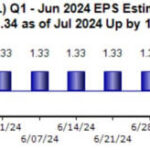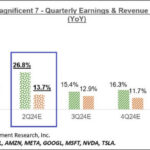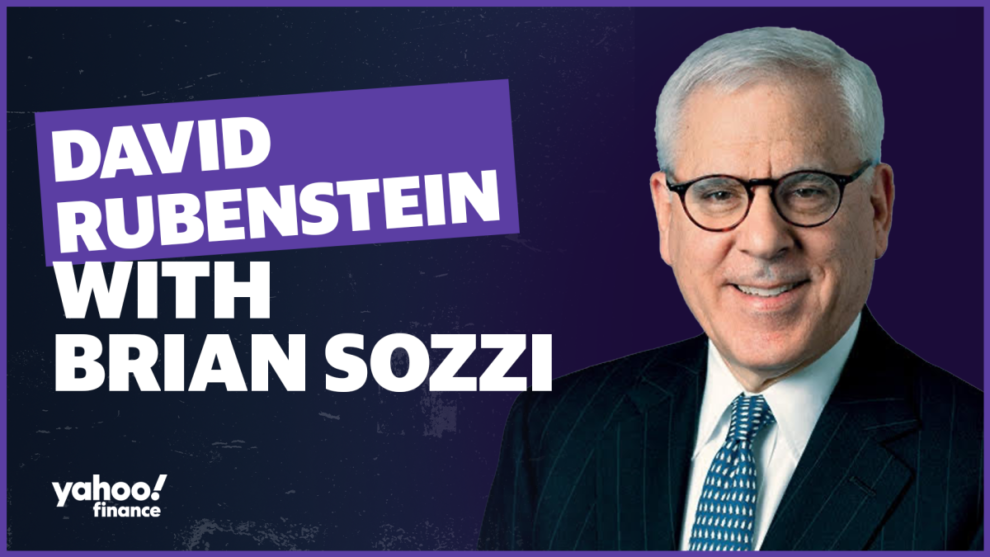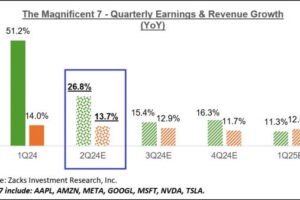Yahoo Finance’s Executive Editor Brian Sozzi sat down for a wide-ranging interview with influential investor David Rubenstein, Co-Founder and Co-Chairman of the global private equity investment company The Carlyle Group (CG). They discussed the current state of the private equity market, the overall stock market, the economy, the direction of interest rates, and Rubenstein’s new television series on PBS called “Iconic America: Our Symbols and Stories with David Rubenstein” which premieres on April 26th at 10pmET.
Rubenstein said the recent banking crisis and the resulting turmoil in the markets may have passed. “I think the federal government did a reasonably good job of patching up the problem once it arose,” he said. “We don’t have a contagion problem as much as we might have thought we were going to have,” Rubenstein added. He also said the federal government may still have to step in again to shore other banks that may be in trouble. “I think First Republic Bank (FRC) is clearly on a watch list and probably somebody at some point will buy it… there’s a big hole in the balance sheet of First Republic Bank I’ve been told. And therefore, I suspect the government will have to provide some assistance if that deal’s going to get done,” Rubenstein said.
On the direction of interest rates, Rubenstein said the Fed is very focussed on bringing down inflation despite the broader ramifications of those rate hikes. “I think the Fed is determined to get inflation down to 2%. Now, some would say maybe 3% would be low enough, but the Fed has said 2%, and as a result, they are tunnel-vision focused on getting that done. So there are side effects on that,” he said.
Rubenstein also spoke about some of his investing regrets which included internet pioneer Netscape, and other big tech companies like Amazon (AMZN) and Facebook (META). “I had a chance to invest in Mark Zuckerberg’s company when he was in Harvard, and he was looking for a little bit of money. My son-in-law told me about it and I passed on that. When Marc Andreessen was trying to raise money for Netscape, we told him that would never get anywhere. We turned that down,” Rubenstein said. On Amazon, he said he had an early stake in the company but “we sold it prematurely.”
Key video moments:
00:00:34 Is the banking crisis over?
00:04:22 Rubenstein on interest rates, the Fed
00:15:55 Rubenstein’s biggest investing ‘regrets’
00:17:30 Rubenstein’s advice for small investors
Video Transcript
BRIAN SOZZI: Joining me now is the Carlyle Group co-founder and co-chairman, David Rubenstein. David, good to see you again. Last time, I saw you were freezing in Davos.
DAVID RUBENSTEIN: I know. It’s much better here.
BRIAN SOZZI: Yes, indeed it is. So lots to discuss with you, your new series, “Iconic America”. I’m very excited about it. It is everything that I very much like to watch, focused on history. But it’s a little bit more on the markets in this world of business and finance. This is the first time we have talked to you since everything that happened in the banking sector in March. What are some of your thoughts as you watch that played out?
DAVID RUBENSTEIN: I think the federal government did a reasonably good job of patching up the problem once it arose. Now, you could argue that they should have been on top of it before it arose. And the San Francisco Federal Reserve Board maybe should have been more closely monitoring Silicon Valley Bank.
But on the whole, I think the US government did a reasonably good job. They protected depositors. They did not protect creditors or shareholders. And I think in Washington today, it’s very difficult to get enough political support to protect creditors and shareholders. It’s easy to get support to protect depositors though.
BRIAN SOZZI: You talk to a lot to leaders. How do CEOs of these banks, how do they get in a situation like that?
DAVID RUBENSTEIN: Well, hindsight’s always 2020. I think in this case, Silicon Valley Bank was obviously growing very, very rapidly. And they had a business model that seemed to work, which is to lend money to venture capital firms and then required them to keep about 85% of the money in their bank. And then they put that money in treasury bills, which became worth less because as interest rates were going up, the bonds were going down in value. So they had a problem that maybe somebody should have picked up on earlier.
But we don’t have a contagion problem as much as we might have thought we were going to have. And clearly, there are other banks that have some trouble now. I think First Republic Bank is clearly on a watch list. And probably, somebody at some point will buy it. But the challenge there is it needs government assistance.
There’s a big hole in the balance sheet of First Republic Bank, I’ve been told. And therefore, I suspect the government will have to provide some assistance if that deal is going to get done.
BRIAN SOZZI: Is there safeguards banks can put in place to avoid a situation like this?
DAVID RUBENSTEIN: Well, sure. And banks do put safeguards in. But in this particular case, I think the banks were growing a little bit too rapidly. And I think under the law, even though there is some view that you’ve reduced the requirements for smaller banks, the Federal Reserve has, under the existing law, the ability to go in with smaller banks and make them put in more capital. I think here, probably the Federal Reserve Board in San Francisco probably should have been more on top of it, I suspect.
BRIAN SOZZI: If First Republic does get sold, like you hinted might happen, and now a bigger bank gets even bigger, does that present risk to the financial system?
DAVID RUBENSTEIN: Well, the biggest banks in the United States now are pretty well capitalized for sure. We don’t have the problem we have in ’07, ’08. There’s always a problem. It’s something big– can happen to somebody who’s very big. But right now, as I look at the big banks, I think they’re in pretty good shape.
Now, the European banks may not be quite as strong as the American banks. I think the American banks are really rebuilt themselves much more after ’07, ’08. Obviously, we saw Credit Suisse went under in effect when UBS had to buy it. I think the other banks in Europe are in reasonably good shape.
BRIAN SOZZI: What goes through your head when you see a UBS scooping up a Credit Suisse. That weakened was just wow to a lot of long-time people, I think, in the financial services.
DAVID RUBENSTEIN: Credit Suisse has been around for over 100 years. And all of a sudden, it’s gone tomorrow. So nobody could believe that was going to happen so quickly. And obviously, there are now litigation about it. And– but I suspect the deal will probably go through.
The European banks have a different situation in the United States. They have different banking regimes. And so each one is different. In the United States, we have one federal regime that really makes the rules. In Europe, there are different rules for Germany or France or Italy. So it’s a little more challenging.
BRIAN SOZZI: Is all of this over?
DAVID RUBENSTEIN: Is all of this over?
BRIAN SOZZI: Turmoil.
DAVID RUBENSTEIN: Turmoil is never over as long as markets are open. There’s always going to be somebody finding something wrong or somebody trying to do something that maybe they shouldn’t do. So I think right now, the worst of the turmoil for the banking sector in the United States, I think, is probably behind us. But it’ll be almost completely behind us when First Republic is resolved.
BRIAN SOZZI: The Fed has really somewhat argue created the situation with the banks by aggressively moving with interest rates and hiking them up. If they continue to move, lifting rates even more to squash inflation, which is clearly still there, what do you think the aftershocks will be?
DAVID RUBENSTEIN: I think the Fed is determined to get inflation down to 2%. Now, some would say, maybe 3% would be low enough. But the Fed has said 2%. And as a result, they are tunnel vision-focused on getting that done. So there are side effects on that.
Side effects are sometimes when you increase interest rates that much, you’re going to have higher unemployment, which they recognize. You’re also probably have a slowdown in GDP. And you might have banks that are a little bit shakier as a result of this.
Historically, when interest rates went up, banks actually did better because they can charge more. But now, we see that some of the banks were doing some things maybe they shouldn’t have done. And as a result, the higher interest rates were making the securities they own worth less. And that produced this problem that we saw as Silicon Valley Bank.
On the whole, I would say, interest rates are going to continue to go up for a while. I suspect in May, I don’t really know, but I suspect in May when the FOMC meets, they’ll have another 25 basis point increase. The markets would suggest that would be enough for the rest of the year. But you never know if inflation rears its head again. Maybe in the fall, they would have another rate increase.
BRIAN SOZZI: Is the– other series of rate hikes that the Fed has put in, is that recession-inducing?
DAVID RUBENSTEIN: The theory of economics is when you increase interest rates, you decrease GDP, and you also increase unemployment. That theory hasn’t worked yet in this particular situation, because the GDP is not going down all that much and unemployment hasn’t gone up at all. If anything, it’s going down.
So people are scratching their heads at the Fed and say, how much more can we do to get the GDP to slow down? Maybe we don’t want a recession, but GDP slows down, inflation goes down, unemployment goes up, that’s something we can tolerate up to a certain level. The economic theory hasn’t been working so far. And that’s in part because there’s not enough workers in the labor force properly. And as a result, it’s a very tight labor market. It isn’t the same that they normally are going to see when they increase interest rates, unemployment does go up. But now, it hasn’t been.
BRIAN SOZZI: Are you surprised by the resilience in the broader stock market?
DAVID RUBENSTEIN: I’ve been surprised that the market has been as resilient as it has been only, because, normally, when you see this kind of dramatic rise in interest rates over the last 12 months, you would expect the GDP to go down, and you expect people talking about recession more than they are. Recessions were predicted for this year by many people. So far, it seems unlikely we’re going to have a recession this year or less likely than people once thought.
BRIAN SOZZI: One of the things we hear from a lot of strategists and people on Wall Street is that the Fed may have broken something. It is unclear to me what that means when we hear that from these folks. What does that mean to you? And do you think they have broken something because of all these rate hikes?
DAVID RUBENSTEIN: The Fed had, and by his own admission, they thought the inflation that came about because of the $5 trillion injected in the economy because of COVID. They thought that that would be a transitory inflation. And Janet Yellen said that, and Jay Powell said that. They now admit that was not right. It was not transitory.
So I think the Fed probably missed the boat there, because they’ve kind of thought this would be, as they say, transitory. It turns out it was more enduring. Now, they’re in an effort to get the enduring inflation down to a 2% level again, which is what we had for 25 years or so. I think 2% is going to be tough to get to, but that’s what their target is.
BRIAN SOZZI: What effects– and I was realizing this. We’ve talked to a lot over the years. And we never really talk about the private equity industry, which is what you do. This is– you co-founded the Carlyle Group. What impacts do higher rates– what have they done to the business of private equity?
DAVID RUBENSTEIN: Remember, the large private equity firms, like Carlyle, Blackstone, KKR, Apollo, have large private equity business. They also have large private credit businesses as well. And those private credit businesses are providing a lot of the debt to finance buyouts or other kinds of needs, where there’s debt needs.
The private equity firms are in reasonably good shape. It’s harder to raise money than it used to be, for sure. It’s harder to get deals done for sure. But none of these firms are really any kind of trouble or anything. They’re all doing well. They’re all still raising some money. And they’re all doing deals.
Now, deals are a little more challenging, because interest rates are higher, so it costs more. So you have to lower your expected rates of return. And so a lot of investors are being warned that returns might come down a little bit. But still, they’ll be reasonably good.
And this is one of the reasons. The old days of buyout and buyouts, you did 5% equity, 95% debt. The famous RJR deal that was done in 1989 was 5% equity, 95% debt. Today, you probably have 50% equity, 50% debt. So you’re not borrowing quite as much.
And there are many more lenders than there used to be. The private equity firms are now lenders as well. There are the private credit organizations that not just banks. So there’s plenty of sources of capital, as competition for lending is pretty good.
BRIAN SOZZI: What unlocks that deal flow? Is it that industry or your industry needs to see a rate cut? What do you need to see in terms of confidence, I guess?
DAVID RUBENSTEIN: Right now, there’s less deals going on, I think, because sellers are saying, wait a second, I don’t want to be selling too cheaply. And people are telling me we’re in a recession, maybe I should sell before the recession comes. But on the other hand, I don’t think it’s worth that much lower than it would otherwise be. And yet the buyer is saying, we’re going to have a recession, so you better sell now.
So there’s a gap between the buyers and Sellers that probably one or two multiple turns. You know, in other words, the buyers want to buy something at 10 times EBITDA multiple, or 11 times, maybe 12. Whereas, the sellers want 13 to 14 times EBITDA. And there’s a gap there, because there are different views and whether we’re going to have a recession and what the recession is going to do to the values of these companies.
BRIAN SOZZI: When things do loosen up a bit, do you view tech, the tech sector, which has been obliterated in terms of valuation. Sure a lot of these stocks have come back, but by and large, trending well below their historical price to earnings multiples. Is that an area of opportunity for the private equity industry?
DAVID RUBENSTEIN: I think it’s a lot of private equity firms are doing a lot investing in tech, and not just buyout firms, but growth capital firms, and so forth. Clearly, the diminution in multiples has been staggering there. But there probably are some pretty good bargains, because some things have probably been oversold. So I suspect you’ll see some private equity firms, growth capital firms going into tech but probably not quite yet.
BRIAN SOZZI: Now that we actually have in our office for a little bit, I would love to just look back on your career a little bit. What made you start a private equity firm?
DAVID RUBENSTEIN: Well, I had worked in the White House for President Carter. We lost the election of Ronald Reagan, which I never thought we would do. I told Carter that Reagan was too old to be president. He was 69. Now, that seems like a teenager to be president, right?
So I had to go back and practice law, which is the only thing I knew. And I wasn’t really good at it. So my clients told me I wasn’t good at it. My partners told me I wasn’t good at it. So I decided I’d better do something else. And I was inspired by Bill Simon, who did a deal on Gibson greeting cards in the early ’80s. And he made a lot of money in a leveraged buyout. And I thought, OK, let me find some finance people that know how to do leverage buyouts, and I’ll do some legal work to help them.
And so I started it when nobody else would really take the lead in getting it done. And so I started in 1987 and recruited some people. We raised $5 million. And then we built the firm.
BRIAN SOZZI: Can that be done today? If I wanted to quit this gig and say, I want to get into the private equity industry, can it be done like you have done it?
DAVID RUBENSTEIN: I think there’s always a space for entrepreneurs. Now, I read that when an entrepreneur wants to start a company, the best chance of doing so is between the age of 28 and 37. And I read that when I was 37.
BRIAN SOZZI: I just aged out.
DAVID RUBENSTEIN: So but there are some people who can do it after 37, but you can certainly do it. You look a lot younger–
BRIAN SOZZI: I appreciate it. Thank you.
DAVID RUBENSTEIN: You look long younger than 37, so you can certainly do it. But I would say there’s always going to be entrepreneurs, always. And private equity might not be as easy to get started in today as it was years ago. When I started Carlyle, there were only 250 private equity firms in the whole world. Now, 10,000 probably. So it’s different.
But there’s always something for an entrepreneurial person to start. And I think it’s a good thing in our country that we have entrepreneurial instincts, and we have people that want to build great companies.
BRIAN SOZZI: Over the decades of building The Carlyle Group, what has motivated you to stay the course and continue to build out the firm?
DAVID RUBENSTEIN: Well, I have to do something, and there was nothing else I was good at. That was one thing. I got inflation to 15% when I worked in the Carter White House, so I couldn’t go back in government. Nobody wanted my legal skills, so I was better at private equity.
I think what motivates me is that you want to achieve something with your life. And what I’m thinking I’m doing is I’m taking most of the money that I’ve made and giving it away. I was an original signer of the Giving Pledge. And I basically been giving away the bulk of my money for philanthropic purposes, a lot of patriotic philanthropy, which is what I’m trying to do to remind people of history and heritage of our country.
BRIAN SOZZI: Take us through the patriotic philanthropy. It’s something you’re focusing on what your series, “Iconic America.” What made you do that? And what is patriotic philanthropy?
DAVID RUBENSTEIN: Patriotic philanthropy, and all philanthropy is probably patriotic, but I called it patriotic philanthropy, because I was trying to remind people of the history and heritage of our country, the good and the bad. So I’ll fix a Lincoln Memorial or the Jefferson Memorial or the Washington Monument or by the Magna Carta or the Declaration of Independence and get people to see these things, so they can learn more about the history of our country, on the theory that we need to have an informed citizenry.
Our country was created on the premise that we’d have an informed citizenry. And if you don’t have an informed citizenry, you’re not going to have representative democracy. So that’s the theory behind it.
I started TV series with show of force, which is a TV production company. It has a lot of experience in this. And we came up with the idea of producing eight iconic American symbols or iconic symbols of our country that you could pick a thousand potential symbols. But these were eight. And these are eight, where we go through the history, let people know something they didn’t know about this before, and hopefully make it educational and informative and entertaining.
And so the first one will be beginning on PBS on April 26. It’s on Fenway Park. And the others are things like the Golden Gate Bridge, the Hollywood sign, the American cowboy, the American bald eagle, Statue of Liberty, and Gadsden flag, and Stone Mountain.
BRIAN SOZZI: You gave me a good stat when we were talking off camera on the Golden Gate Bridge. And it made me think, wow, I don’t remember learning that in school. Is there a problem in the education system where some of these things, maybe they’re not being taught or getting lost in the shuffle somehow?
DAVID RUBENSTEIN: Well, we don’t teach American history as much as we used to. And we certainly don’t teach civics. But what we were talking about in the Golden Gate Bridge, I didn’t know this either until I began to do the research. And I walked across the bridge, it’s a little death-defying to do that, because your traffic is whizzing by.
Sadly, 125 people a year jump off the bridge. Now, there are guards to kind of keep them from falling into the water. But still, 25 people a year do jump off. Unfortunately, they die, of course.
The bridge was opposed by people at that time. There were 4,000 lawsuits filed to keep the bridge from being built. People thought it was going to ruin Marin County, going to ruin San Francisco. Obviously, it turned out to be one of the most beautiful bridges in the world.
It sways 27 feet either way because of the wind. You have to make it not so stable that it can’t bend when the wind comes. So 27 feet either way, it has the flexibility to bend, according to the winds. And it’s an incredibly important part of our infrastructure in that part of the country.
BRIAN SOZZI: When you’re not doing cool things like this and running The Carlyle Group, you’re interviewing a lot of interesting folks. Out of everybody you have interviewed and talked to through the years, who has been the most interesting and why?
DAVID RUBENSTEIN: Well, I haven’t had a chance to interview yet, that would be the most interesting.
BRIAN SOZZI: You have to have me on somewhere. I’m pretty interesting.
DAVID RUBENSTEIN: Yeah, that would be the most interesting. But I would say when I did Jeff Bezos, that was pretty good. I’ve known him for a while. And we had a really good rapport. I like it when I have a live audience, because you can play off the audience a bit. And when people have a sense of humor and self-deprecating sense of humor, that usually works.
I did George W. Bush and Bill Clinton together. That was pretty good. I’m assuming I’m going to do Bill Clinton and Hillary Clinton together. They’ve rarely done that. I think in the future, I’ll be interviewing Kim Kardashian, which probably–
BRIAN SOZZI: You may break the internet with that one.
DAVID RUBENSTEIN: Well, that will get some attention for sure.
BRIAN SOZZI: How do you, you know, did you invest in Jeff Bezos and Amazon when he was coming up?
DAVID RUBENSTEIN: We had a stake in the company, but we sold it prematurely. Let’s put it that way.
BRIAN SOZZI: Are there any other ones that you have interviewed, you’re like, I regret not investing in that company or leader, or leader?
DAVID RUBENSTEIN: Well, I had a chance to invest in Mark Zuckerberg’s company when he was in Harvard. And he was looking for a little bit of money. My son-in-law told me about it. And I passed on that. When Marc Andreessen was trying to raise money for Netscape, we told him that would never get anywhere. We turn that down, so I’ve had a lot of regrets.
BRIAN SOZZI: What did you learn from those?
DAVID RUBENSTEIN: Don’t assume that because somebody doesn’t look like you that he doesn’t know what he’s doing. So if they come in, they’re wearing sandals, long hair, they’re not dressed well, they might not mean that they’re not a good investor.
BRIAN SOZZI: Didn’t expect that answer, though. That’s very good. In terms of advice for other leaders, younger leaders, having interviewed all these really experienced and interesting people over the past few decades, what’s your advice to the up and coming next generation of leaders?
DAVID RUBENSTEIN: Hard work is better than doing nothing. Read as much as you can. Network as much as you can. Learn how to speak in a very persuasive way. And also, don’t be upset if you fail at something. Failure is good, because in the end, you’re going to learn more from it. And everybody successful I’ve interviewed has failed at something. You’ve got to pick yourself up and get back into the game.
BRIAN SOZZI: Lastly, in terms of guidance or advice for investors. It’s a challenging time right now. They have a lot of information coming at them, a lot of people, their social media. How can the average investor find success in an environment like this?
DAVID RUBENSTEIN: The average investor should really go with a good money manager and probably a good money market fund or an equity fund or a fixed income fund. The average person who’s got a few hours a week to spend on this is probably not going to beat the market, average is not going to beat Warren Buffett. So go with the market averages. And that’s probably the easiest way and produces less gray hair, I would say.
But if you really want to learn to be an investor, you’ve got to put time into and energy into it and real effort. But if you’re the average person, probably going with market indexes is probably the best thing.
BRIAN SOZZI: All right. Let’s leave it there. David Rubenstein, co-founder and co-chairman of The Carlyle Group. And very exciting series, “Iconic America,” I’m looking forward to the Golden Gate Bridge episode for sure. Even the Hollywood sign, I even realize that.
DAVID RUBENSTEIN: That’s right. Well, it used to be Hollywoodland. That was originally–
BRIAN SOZZI: Hollywoodland?
DAVID RUBENSTEIN: See, it was supposed to sell land, houses in Hollywood, and was called Hollywoodland. They took the land off when the house were all sold.
BRIAN SOZZI: I need to get off Long Island. I got to take all these things. And David Rubenstein, always good to see you. Thanks for giving us the time.
DAVID RUBENSTEIN: My pleasure. Thank you.
















Add Comment